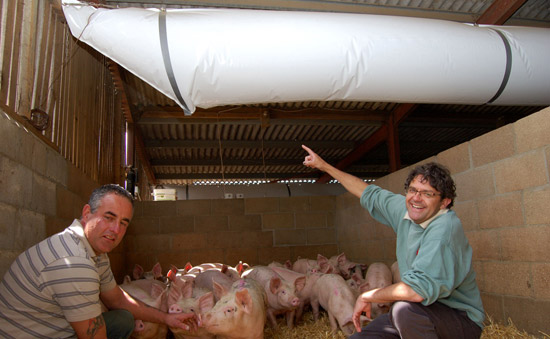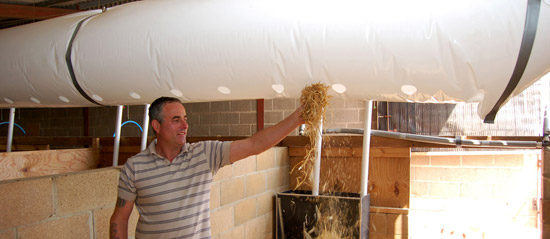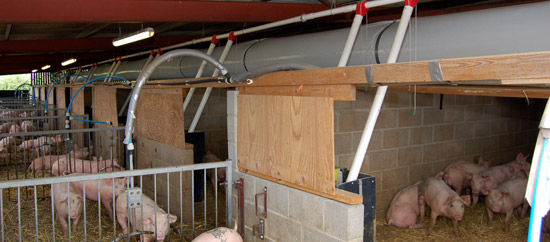 “The boys are much dirtier than the girls – but since we put in the ventilation both sexes now have clean pens!” That was how Derek Buckmaster summed up the dunging habits of the separate sexes of pigs in his three finishing houses.
“The boys are much dirtier than the girls – but since we put in the ventilation both sexes now have clean pens!” That was how Derek Buckmaster summed up the dunging habits of the separate sexes of pigs in his three finishing houses.
Mr Buckmaster and his wife, Anita, contract-rear 850 pigs a time in three Suffolk-style finishing houses at their 150-acre (60 ha) Priory Farm, Braiseworth, near Eye in Suffolk. Although these houses are Yorkshire boarded, because they are lean-tos built on to a central grain store, natural ventilation is limited. The 18ft x 10ft (5.4m x 3m) pens have generously-strawed sleeping areas and push-through dunging passages, also strawed.
The pigs do well under this system but during hot weather tended to dung in the sleeping areas. This meant that each pen had to be manually cleaned out and freshly strawed every morning adding at least an hour to the daily workload.

Derek Buckmaster (left) with Tim Miller, who advised installing the ducting ventilation system which solved a dirty pens problem.
On the advice of BPEX, Derek called in Tim Miller, environmental specialist with the Proctor group. On seeing the houses Tim advised installing 24in (630mm) fans connected to perforated polythene ducting running the length of the 90ft (27.3 m) buildings. The ducts are positioned over the centre of the sleeping areas and the line of 3 ½ inch (90 mm) diameter perforations direct a constant flow of cool air down on to the pigs.

Perforations in the ducting direct air straight down on to the pigs, demonstrated here by Derek Buckmaster.
Two systems were installed in May 2007 at a cost of £850 each, including fans and controls. “As soon as we put them in we didn’t have a single dirty pen,” said Derek. Apart from saving the laborious task of manual mucking out, were there any benefits?
As a result, the Buckmasters also found that the pigs’ feed conversions and growth rates improved earning them a bonus from their pig supplier.
The pigs are finished at 100 kg. The sheds are then thoroughly cleaned and disinfected including the polythene ventilation ducting. The ducting lasts about three years before eeding renewal at a cost of £140, but the system has proved well worthwhile, says Derek. He reckons the cost of running the fans – about 3p per hour is a good investment in the health and welfare of his pigs.
Why are the gilts cleaner than the boars? Derek Buckmaster doesn’t speculate but agrees there could well be a human analogy here!

Polythene ducting was installed all the way down Derek Buckmaster’s Suffolk-style finish house.

A Proctor Group


